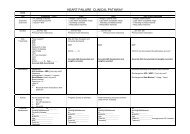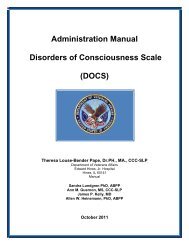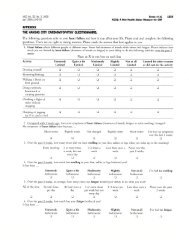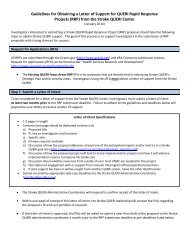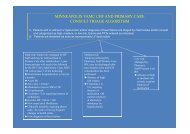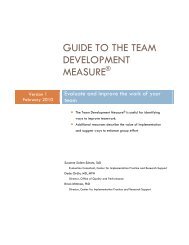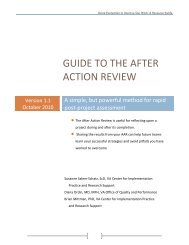The Veteran Supported Education Service Treatment Manual: VetSEd
The Veteran Supported Education Service Treatment Manual: VetSEd
The Veteran Supported Education Service Treatment Manual: VetSEd
Create successful ePaper yourself
Turn your PDF publications into a flip-book with our unique Google optimized e-Paper software.
mental illness so I must be weak. <strong>The</strong>re is no point in trying to go to school because I am<br />
too messed up.‖<br />
Implementing Worksheet #15: Stopping Self-Stigma<br />
<strong>The</strong> various assumptions about negative self-talk and ways of challenging such self-talk<br />
are summarized as Worksheet #15: Stopping Self-Stigma. A blank version is provided in<br />
Part Two Section Seven, which readers are welcome to photocopy for addressing selfstigma<br />
that may haunt them or friends. We illustrate here with an example from Edgar, a<br />
returning <strong>Veteran</strong> living with TBI and PTSD. <strong>The</strong> worksheet comprises five steps. First,<br />
we begin with a clear statement of the hurtful attitude using the formula:<br />
I Must Be __________________ Because ________________.<br />
When people talk about themselves with MUSTS it often contributes to negative and<br />
irrational feelings. This kind of formula helps persons put their irrational thoughts into<br />
words. Like many persons with mental health issues who self-stigmatize, Edgar believed<br />
he was a weak person because he sometimes was overwhelmed by his TBI and PTSD.<br />
<strong>The</strong> next step is to further define the ―must‖ statement as true-false assumptions. One<br />
way to do this is to change the statement from a personal "I" belief to a statement that<br />
includes "all people like me." With this in mind, Edgar broke his hurtful belief into<br />
All strong people don't have PTSD.<br />
Weak means bad. All people who have problems are bad.<br />
<strong>The</strong> truth of ―I‖ statements is not always clear; however, change it to a general statement<br />
about humankind, and its falseness becomes evident.<br />
Next, the person challenges these assumptions by asking others whether they believe the<br />
two attitudes are true. First, Edgar sought out a circle of trusted people for feedback, in<br />
this case a group from After Hours, a <strong>Veteran</strong>‘s social club he attends weekly. Edgar also<br />
decided to check with his older sister Connie, mayor of his hometown and someone in<br />
whom he has confidence. Edgar was surprised by the response from people at After<br />
Hours. Not only did they disagree with the statement that "Strong people don't have<br />
PTSD," to a person, they all relayed some experience with other mental health concerns.<br />
Two <strong>Veteran</strong>s, in fact, had been hospitalized like Edgar. Members of After Hours also<br />
took exception that struggling with personal problems meant a person is bad. Edgar was<br />
especially moved by what Connie said.<br />
70 | P a g e



